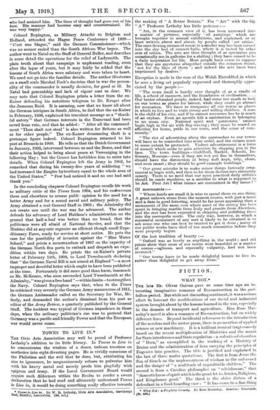TOWNS TO LIVE LX.*
THE Civic Arts Association may well be proud of Professor Lethaby's addition to its little library. In Towns to Live in he concentrates the wisdom of a dozen tedious treatises on aesthetics into eight diverting pages. He is vividly conscious of the Philistine and the evil that he does, but, attributing his sins to ignorance, he magnanimously refuses to pulverize him with his heavy metal and merely prods him playfully with epigram and irony. If the Local Government Board would require each Alderman within the Realm to render a sworn declaration that he had read and ultimately understood Towns to Live in, it would be doing something really effective towards • Towns to Lice Irk By W. St, Lethaby„ Civic Arta Association, Clautborpe Hall, Burnley, Lancashire. Plel. net.] the making of " A Better Britain." For " Art " with the big " A " Professor Lethaby has little patience :- "Art, in the common view of it, has been narrowed into a matter of pictures, especially ' oil paintings' whioh are brought together in annual exhibitions, and explained, or at least written about and about, by people called ' art critics.' The once flowing stream of music in a ander way has been turned into the dry bod of concert-hells, where it is tasted by other sets of critics. The arts are thus thought of as specimens yeu occasionally see in galleries for a shilling ; they have ceased to be a daily inspiration for life. Moat people have come to suppose that they are mysteries altogether outside the common round, ' not for the likes of them' ; and indeed the arts have been imprisoned by dealers."
Exception is made in the case of the Welsh Eisteddfod,in which he sees a living art popularly expressed and thoroughly appre- ciated by the people:—
"The town itself is hardly ever thought of rie a cradle of
life, a school of manners, and the foundation of civilisation. . Our better educated people, indeed, had come too much to look On our towns as places for labour, while .they could go abroad for recreation. We have to reorganise all our towns as places in which to live and to train strong and willing children. A man is the child of his city, and if he cannot reverence her he is much of an orphan. Even an apostle felt a satisfaction in belonging to no mean city. National spirit and patriotism ' cannot begin high in the air with flag-waving ; they must be reared on affection for home, pride in our town, and the sense of com- munity."
" The riot of advertising along the approaches to our towns will have to bo controlled into some order, and the citizen must to some extent be protected. Violent advertisement is a form of assault which seeks to gain attention by slapping you in the face. The town buildings— Guildhall, Market, Schools, In- firmary, Museum—even if they are not yet fine in themselves, should have the distinction of being well kept, tidy, clean, and even smart ; they should be good example buildings."
" Our great mistake is to make minor things furiously orna- mental to begin with, and then to lot them doelme into slatternly misery. There is no need that our most practical daily utilities should be made repulsive, as a sacrifice to what is supposed to be Art. Poor Art t what crimes are committed in thy name ! "
Of monuments :— " Where funds are small it is wise to spend them on one thing. A great unhewn stone from the nearest source, with just a mune and a date in good lettering, would be far more appealing than a monument of the same cost where most of the money has been spent in bringing marble from Italy and granite from Aberdeen, and the rest has been expended in chipping and polishing these into the necropolis mode. The only way, however, in which a successful monument of any sort is likely to be obtained is to ask some one who can beet be trusted to get it done ; many of our public works have died of too much committee before they were properly begun.
Of the lost tradition of beauty :-
"Oxford was as lovely as anything in the world ; and old prints show that most of our towns were beautiful as a matter of course —ugliness, and especially vulgarity, had not boon invented."
" Our towns have to be made delightful homes to live in, rather than delightful to get away from."


































 Previous page
Previous page